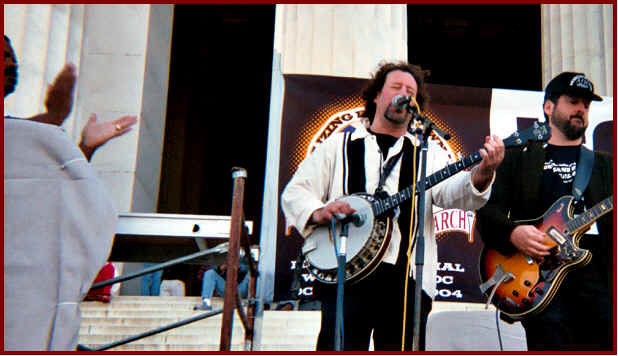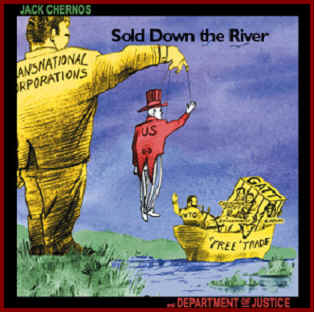


"Sold Down the River"
By Jack Chernos
The
President signed the GATT treaty into law
Fast-tracked through Congress with only hours of debate
We've ceded our authority in the blink of an eye
To a group of corporations that have purchased the right
They call it
'free' trade, I'll tell you what that means
You can have your unions here, but the factory is overseas
Putting poisons in the water and paying pennies
We're being
sold down the river to the WTO
Sold down the river, sold down the river
Sold down the river to the WTO!
They're
meeting in Seattle to plan the next century
And we need to be there in the streets
When the size of corporations exceeds the finances of nations
The democratic process can not compete
They call it
'free' trade, and I'll tell you what that means
Your health and safety laws, democratically made
Can be challenged from abroad as barriers to foreign trade
We're being
sold down the river to the WTO
Sold down the river, sold down the river
Sold down the river to the WTO!
©1999 Jack Chernos
To listen to this song, please visit Jack Chernos' Website.

On November 30, 1999, a diverse group of over 40,000 people gathered on the streets of Seattle, Washington in protest against the World Trade Organization (WTO). People of a variation of races and ethnicities put aside their difference this day and became one united front. They took to the streets with a revolutionary kind of protest, “festive resistance.” Through this, activists were able to incorporate artistic and musical expression into their protest. Although art and music were not the focus of the protests, these elements allowed people to communicate their grievances and let their voices be heard. One song in particular, “Sold Down The River” by Jack Chernos, was played in continuous-loop from the Steelworkers' billboard truck the entire length of the Seattle protests. The song expressed the dislike towards the WTO and globalization. It called activists to speak out about their rights. It helped to bring this diverse group of people together to form a collective identity. Through an analysis of this song’s diagnosis, prognosis, motivation and music, it can be determined that this song, as well as many of the other songs of the protests, was instrumental in uniting and unifying a fight for global equality.
“Sold Down the River” is heavily centered on the diagnosis. The diagnosis of a song depicts the problems of an oppressed group of people. This song in particular focuses on the protesters’ aggravations with the WTO. As the title and chorus of the song suggest, people feel like they are being “sold down the river.” Protesters feel that large corporations are buying their way up the authoritative ladder while third world countries and everyday citizens are being ignored. One line of the song states, “ We’ve ceded our authority in the blink of an eye, to a group of corporations that have purchased the right.” The song continues on about another problem with the WTO: free trade. People believe that the WTO trade policies favor large corporations and money while ignoring health and environmental factors. Lyrics cry, “Your health and safety laws, democratically made, can be challenged from abroad as barriers to foreign trade.” This line of the song refers to some of the unfair decisions made by the WTO. In two cases in particular, the hormone beef and the shrimp turtle cases, the WTO ruled against countries that adopted regulations to protect public health and the environment. Activists gathered on the streets of Seattle to protest these and other unfair policies of the WTO. The grievances of this group of people are reflected in this popular song used in the Battle of Seattle.
“They’re meeting in Seattle to plan the next century, and we need to be there in the streets.” As Jack Chernos sings these words, he urges people to band together and fight against injustices. “They’re” or the WTO, met in Seattle for their annual ministerial meeting in 1999. Activists against the WTO and globalization, decided to organize themselves and protest in the streets during this meeting. Organizations planned months in advance for this monumental event. They hoped that the timing and their ability to unify would bring about a momentous change. This aspect of the song represents the prognosis, which lets people know what they can do to make a difference. The song urges people to let their voices be heard and to express their grievances. People are called to rise above their oppression and overcome global injustices.
To overcome injustices, people must be willing, must be motivated, to join in the cause. “Sold Down the River,” motivates people to become a part of the global justice movement. Not only does this song talk about grievances, but it also calls people to fight. This gives protesters hope that change will occur, thus making them more motivated to band together. The lyrics are something that anyone interested with the cause can identify with so people are more likely to be willing to join. Also, the use of personal pronouns creates a unifying voice. Lyrics use “we” to show that everyone is included and no one is alone in the fight. “We’re being sold…, We’ve ceded our authority… and We need to be there…,” are just some of the lines of the song that create feeling of belonging among activists. The use of pronouns such as “they” and “you” to identify the WTO creates a solid target for the protesters’ grievances. This allows people to know that they are fighting against an organization that they might influence to change instead of just rallying in the streets for nothing. The use of repetition in the song allows anyone that hears this song to join in. For example, the chorus repeats the words, “sold down the river.” This was particularly helpful in uniting people in streets, as protesters could join in singing as they marched for their rights. The slow beat of the music allows everyone to hear and understand the message behind the lyrics. The unique sound of the banjo creates an enjoyable tune. The rhythm of the music makes people want to tap their feet along and sing and dance for a worthy cause. The group that gathered on the streets of Seattle was a very diverse group. However, through songs like this one, people were motivated to put aside these differences and unite as one solid front, to form one collective identity that everyone could relate to.
The Seattle protests against the WTO were revolutionary in their ways. Organizations and activists were able to bring together a diverse group of people to form one unified front. During the days of the protests, activists participated in what has been called festive resistance, or protests that involve artistic and musical expression. Music, in particular, was instrumental in bringing diversity together to form a strong bond among protesters. One of the main songs played along the streets of Seattle was “Sold Down the River” by Jack Chernos. This song focuses heavily on the injustices felt towards the WTO but also provides solutions for change. The lyrics motivate people to join together and fight for global justice. Through music, such as this song, protesters that gathered at these monumental protests formed a collective identity with one another. With a strong group such as this one, change was not as impossible as it may have seemed. These protests helped to spark a global justice movement that continues to fight against global injustices and bring about a change in the world today.
Created By Michelle Manzi, 2006. The College Of New Jersey.
Works Cited and Additional Resources
All information not cited is thought to be public domain, if any problems with intellectual property arise,
please email me at manzi3@tcnj.edu